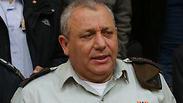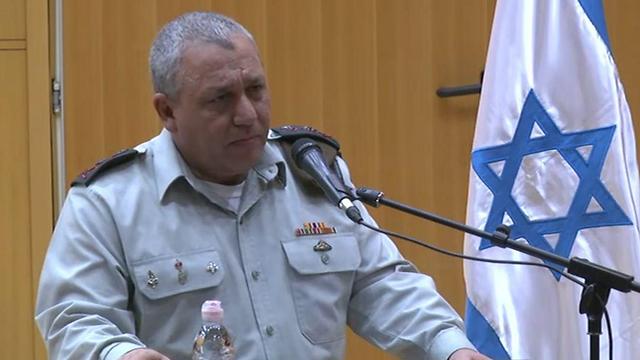

IDF chief: Hezbollah suffering from crisis of morale
Eisenkot asserts Nasrallah's recent threats to fire rockets at sensitive facilities in Haifa and Dimona are merely meant to create deterrence and maintain the status quo with Israel while his organization was deep in crisis over its involvement in Syria.
IDF Chief of Staff Gadi Eisenkot asserted on Wednesday that Hezbollah leader Hassan Nasrallah was all bark and no bite as his threats against Israel come while his organization is deep in crisis.
Speaking in front of the Knesset's Foreign Affairs and Defense Committee during a closed session, the IDF chief repeated past military assessments that while Hezbollah's involvement in the Syrian civil war allowed its fighters to gain significant operational experience, it sparked a crisis in the terror group affecting both its finances and its fighters' morale.
Eisenkot told the committee members that Nasrallah's recent threats to fire rockets at the Haifa ammonia facility and the Dimona nuclear reactor were meant to create deterrence and maintain the status quo with Israel as he sees it.
The IDF chief added that at present, he does not see willingness among enemies both on the northern front and in Gaza to initiate a military campaign against Israel.
He did note, however, the election of the radical Yahya Sanwar as the head of Hamas's political wing in Gaza proves that any distinction made in the past between the Gaza terror organization's political and military branches was now null and void.
Regardless of this, he said the Gaza front was at the top of the IDF's priorities and that NIS 2.4 billion have been invested this year into handling Hamas's terror tunnel threat.
The IDF chief also addressed the Syrian Golan Heights, saying that with the coming spring the battle for control over the Syrian part of the Golan may resume. Israel's interest, he said, was that we'll have a state organization and proper authorities to work with, alongside the withdrawal of foreign forces the return of United Nations Disengagement Observer Force (UNDOF).
At the beginning of the closed session, the IDF Chief noted the goals he had set for the Israeli Army during 2016, saying that first and foremost was the IDF's continued preparedness, which he was satisfied that it had managed to secure. He also mentioned the improvement in the amount and quality of training, military intelligence and armaments.
Eisenkot noted that 2016 was quiet and saw very few security problems relative to the turmoil in surrounding countries, describing how the first six months were characterized by the same wave of terrorism inflicting the country from 2015, and how the national situation had considerably improved in the latter half of the year.
Mentioning some statistics to make his point, Eisenkot said that since the beginning of 2016, the IDF has killed 171 terrorists, almost half of whom were Israeli citizens. According to Eisenkot, a key way in reducing terrorism was the selective use of force that separates between terrorists and the rest of the populace, allowing an environment of education and work on the Palestinian side that is important to maintain at any given time.
Eisenkot then spoke about the Azaria sentence, saying that he completely separated the command aspect from the judicial aspect throughout the affair, so as to maintain an objective viewpoint. He also said that the outside interference by the government and media was unnecessary and often carried inaccuracies that were instilled in the public's mind, without any connection to facts or reality.
Though he stressed that the legal proceeding should have been allowed to take place without interference, Eisenkot nevertheless emphasizied that he supports the court's verdict. He also backed up the decisions made by Azaria's commanders' on the field at the time. He reasoned that he differentiates between a soldier's mistake, that needs to be learnt from, and between negligence or moral failure, that can't be backed or allowed.
















